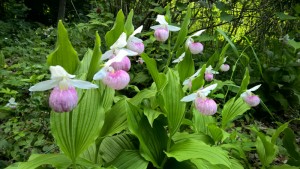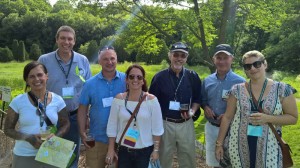
One of the benefits of having a long journey home from a conference is the amount of time you have to reflect. In this article, I will try to delve a bit deeper into one topic that has been on my mind for some time, but first, a few thoughts about the recent APGA conference.
APGA 2015 – Watering our roots
The American Public Garden Association team again did not disappoint, they organized a fabulous conference with a great programme and wonderful host gardens. Many thanks to our hosts Minnesota Landscape Arboretum and Como Park Zoo & Conservatory, including the large group of very helpful volunteers. A big thank you to Casey Sclar and the APGA team for providing us with yet another marvellous conference.
In addition to following the general programme, we had the pleasure of presenting our poster on “Data Quality”, which kicked off several good discussions with the conference delegates. Thank you for everyone visiting our poster, exhibit on Thursday and workshop on Friday. A special thank you goes to Greg Payton from our North American Reference Garden, The Dawes Arboretum, who helped out at the exhibit and workshop, and to Laura Caddy from The Devonian Botanic Garden who helped out at the workshop.

For readers who did not have the pleasure of joining the AGPA conference, I cannot recommend it warmly enough. The conference covers a very wide range of topics presented by the best in the industry, combined with an extremely friendly atmosphere in beautiful surroundings. A winning combination.
Are Botanic Gardens part of the “Knowledge Driven Industry”?
The “Information Age” is thought to have gradually taken over from the “Industrial Age” with the introduction of computers and the internet in the 80’s and 90’s. The era opened up new opportunities which some successful organizations have embraced, such as Google and Amazon. These organizations can be considered to be part of the “Knowledge driven industry”. One of the key characteristics of any “knowledge driven organization” is how it applies information technology to improve how it operates.
I will not try to speculate whether botanic gardens are part of the “knowledge driven industry”, but there are clear indications that several modern gardens follow some of the ideas adopted by sector. The key aspect is that these organizations realise the value of having good data with which to make informed decisions. Access to this data is not exclusively for management, but to the organizations as a whole. In this setting, it is not only visitor numbers and Facebook followers that count, but ALL aspects of the operation, including plant collection data.

The challenge for organizations is to capture relevant information effectively and at a high quality. The desire for more and better data makes record keeping more important than ever.
Record keeping: Mission Impossible
The first botanic gardens in the 16th century already had plant records in the form of written ledgers. The basic principle of record keeping in a botanic garden probably did not change much until computers where accessible to the mass market in the late 1980’s. Since then, plant records have followed a predictable pattern as a more advanced electronic form of the original ledger. With IrisBG, we try to follow the growing appetite for information by making it easier to capture, access and share plant collection data. However, with the increased demand for quality data, the lone record keeper’s job is getting ever more challenging. This is why we focus on delivering a professional information technology with a low usage threshold, which makes it possible for institutions to more freely delegate data capture in a responsible manner. We have applied many techniques to achieve this, including granular access control, support for handheld, data import, usage logging, advanced search capabilities, etc.
With IrisBG, we aim to give organizations more flexibility in how they operate the garden by allowing them to use their plant collection data as an integral part of managing the institution. Our role is to help gardens to capture and access the information you need to make informed decisions about the daily running of the garden.
We hope through our efforts, we make it easier for you to succeed in the important work you do.

Links
- http://2015.publicgardens.org/
- https://en.wikipedia.org/wiki/Knowledge_economy
- https://en.wikipedia.org/wiki/Information_Age
